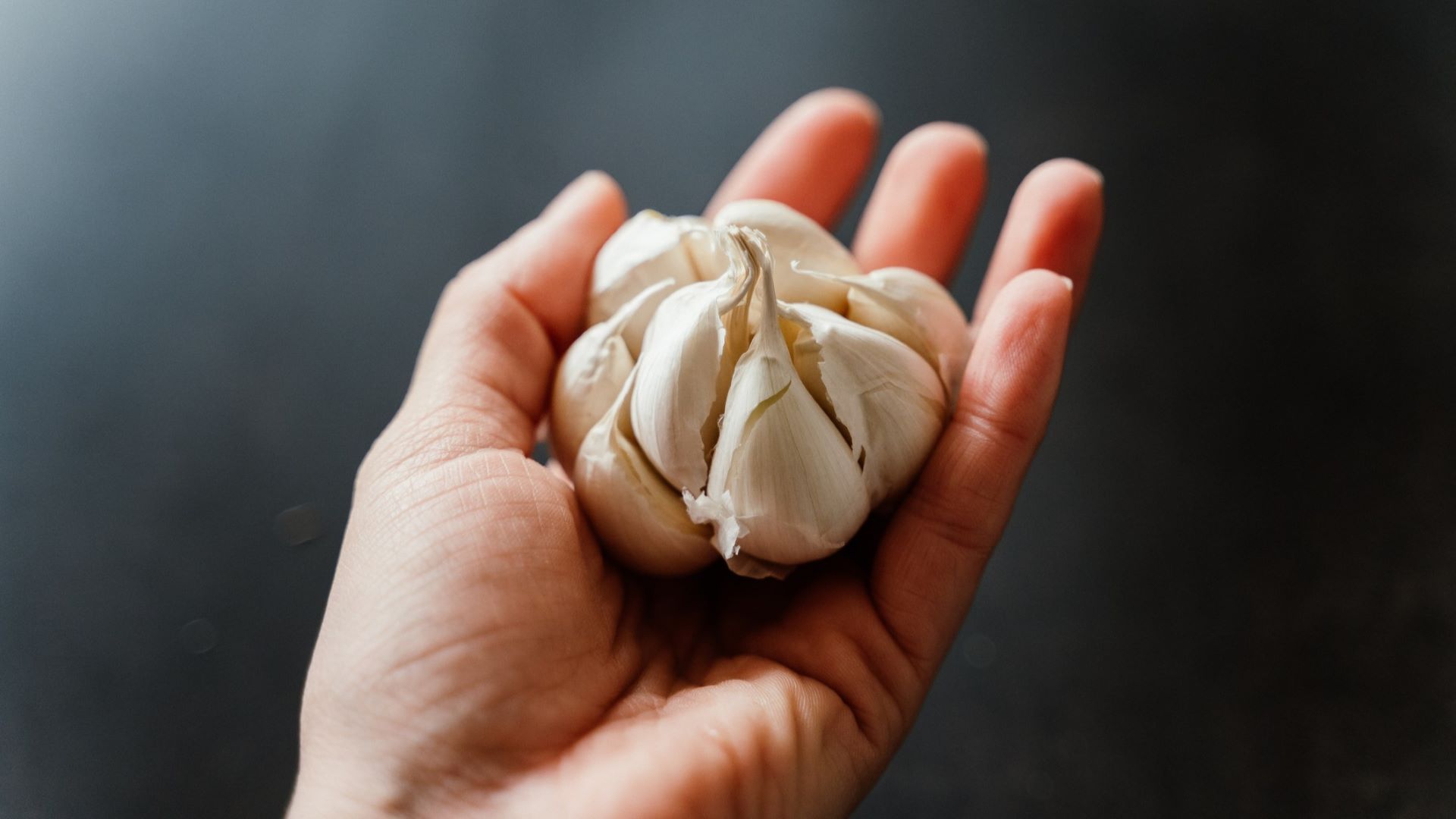I ate a clove of garlic almost every day for a month—here's what I found
What happens when you eat 25 cloves of raw garlic over a month?

I’ve done some weird things in my time as a writer for a health and fitness website, but deciding to consume a clove of raw garlic every day is definitely one of the oddest and, honestly, most unexpected.
Even though I kept seeing videos cross my feed of health influencers lauding the benefits of eating raw garlic, garlic was something I actively avoided for years, as part of a restrictive elimination diet due to illness.
But I'd recently begun making pesto at home (I am never going back to the shop-bought stuff, it's amazing) and then eating it as a dip with bread for dinner. The recipe called for a whole head of garlic in each 500ml batch so I calculated that over a month I was consuming a whopping 25 cloves of raw garlic in this way, as well as a substantial amount of fresh basil and pine nuts.
Over the course of a month, I had my raw-garlic-packed pesto (or basil-y garlic paste, you decide) almost every day, and I noticed some surprising changes. Here's what happened, along with the view of a dietitian on the risks and rewards of regular raw garlic eating.
1. My skin improved
One of the most noticeable changes was that my complexion became clearer. I've struggled with hormonal acne for most of my adult life, so it was fantastic to have that glass-skin look. Garlic has antibacterial and antimicrobial properties, which could improve skin health by tackling acne-causing microorganisms on the face. Unfortunately, there is not enough significant research available to support this, according to a 2011 review from the journal Dermatol Reports, and it is unclear whether these antimicrobial qualities would even affect the skin when consuming garlic orally.
Also, with so many variables changing over a month, I don't think I can credit my smooth skin entirely to the consumption of garlic. Although there were no other changes that I was aware of, the quality of my sleep may have improved, I may have been drinking more water than I normally would or a change in the weather could have meant my skin was exposed to fewer irritants.
Can eating raw garlic improve your skin?
I asked Roxana Ehsani, MS, RD, CSSD, LDN, a registered dietitian and sports dietitian, whether it was possible to see such an improvement from eating raw garlic. "Garlic can reduce inflammation, which may play a role in improving skin health by reducing the risk of developing acne or other skin conditions," says Ehsani.
While there isn't much evidence to prove the effectiveness of consuming raw garlic to treat acne, it did take off as a TikTok trend earlier this year, with many users claiming it cleared up their acne flares and gave them clearer skin. Anecdotal evidence indicates that garlic could be a skin-boosting ingredient, but there are many other foods you could apply this quality to as well.
Garlic is full of vitamins and minerals that your body needs for normal function and good health, such as vitamin C and vitamin E, which you are also likely to find as topical ingredients in the skincare aisle of your local pharmacy. While I'm not suggesting you rub a clove of garlic on your face, garlic is rich in these health-promoting vitamins and your body will thank you if you consume your RDA.

Roxana Ehsani is a certified specialist in sports dietetics and a former spokesperson for the Academy of Nutrition and Dietetics. She holds a Bachelor of Science in Human Nutrition, Foods, and Exercise from Virginia Tech and a Master of Science in Clinical Nutrition and Dietetics from the University of Pittsburgh.
2. My digestive system seemed to adjust
I followed the low-FODMAP diet for years in an attempt to support my uncomfortable digestive system and limit symptoms of irritable bowel syndrome (IBS). It was recommended to me by my doctor and is an elimination diet where you cut out all potentially IBS-triggering foods (those containing fermentable oligosaccharides, disaccharides, monosaccharides, and polyols).
Get the Fit&Well Newsletter
Start your week with achievable workout ideas, health tips and wellbeing advice in your inbox.
Garlic is a high-FODMAP food, so I avoided even the smallest hint of garlic powder (which meant my favorite Thai sweet chili chips were out, much to my chagrin). I’ve slowly reintroduced garlic over the years, but would usually consume it cooked and in small quantities, so a raw clove almost every day was a big step up.
I noticed some digestive irritation in the first week of eating raw garlic, but this also seemed to have leveled out by the end of the month. Perhaps my digestive system is more adaptable than I thought.
Can eating raw garlic cause digestive issues?
"Eating raw garlic may cause an upset stomach, with symptoms such as bloating, heartburn and gas in some people," says Ehsani. "It's also considered a high-FODMAP food, so may cause increased gastrointestinal distress or discomfort for people with IBS."
On the other hand, garlic contains prebiotic fiber that in someone without IBS could improve gut health by feeding the good bacteria in the digestive system.
3. My breath stank
On the less desirable side of the outcomes, I developed really bad breath. That's why I ended up eating 25 cloves over the month rather than a full 31—I couldn't hack eating it every single day.
I wouldn't mind too much, but it's the sort of bad breath that lingers beyond a good teeth clean and into the next morning. I'm sure if my dog could speak, she would complain.
Does eating raw garlic give you bad breath?
A well-known side effect of eating garlic, raw or otherwise, is that it is likely to give you lingering garlic breath and the people around you may start to cringe when you talk. But why is this? "It contains sulfur compounds, that when broken down cause a smell or bad breath," says Ehsani.
Are there any other benefits to consuming raw garlic?
So, aside from those three garlic-related impacts I noticed, are there any other benefits to be had from consuming raw garlic, even in less extreme quantities than I tried?
"It may support your immune system by reducing inflammation and storing white blood cell count," said Ehsani. "It's also said to have anti-viral properties, helping support you when you are feeling ill. It may help support and lower blood pressure and blood sugar as well."

Lou Mudge is a Health Writer at Future Plc, working across Fit&Well and Coach. She previously worked for Live Science, and regularly writes for Space.com and Pet's Radar. Based in Bath, UK, she has a passion for food, nutrition and health and is eager to demystify diet culture in order to make health and fitness accessible to everybody.
Multiple diagnoses in her early twenties sparked an interest in the gut-brain axis and the impact that diet and exercise can have on both physical and mental health. She was put on the FODMAP elimination diet during this time and learned to adapt recipes to fit these parameters, while retaining core flavors and textures, and now enjoys cooking for gut health.
-
 I’m a personal trainer and I tell all my clients to do this weighted workout to build muscle and bone health
I’m a personal trainer and I tell all my clients to do this weighted workout to build muscle and bone healthMake home training even more effective
By Maddy Biddulph Published
-
 I'm always stiff from sitting, so I tested out a 12-minute morning mobility routine to see if it could help
I'm always stiff from sitting, so I tested out a 12-minute morning mobility routine to see if it could helpThe short routine taught me a lot about my body
By Becks Shepherd Published